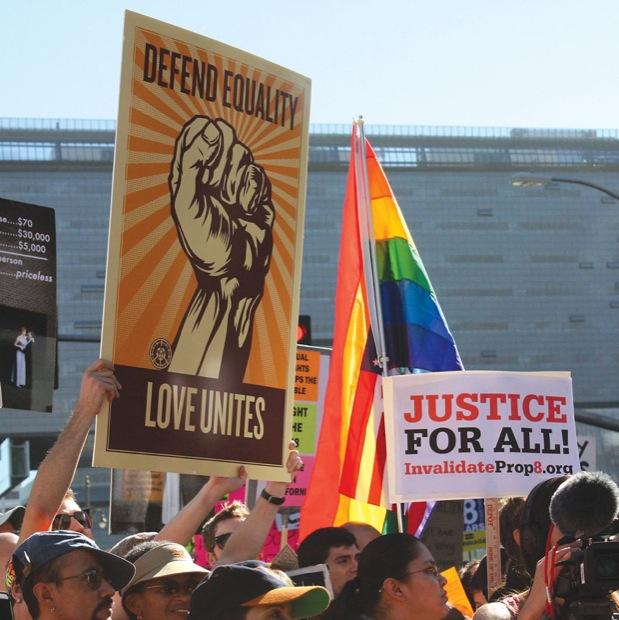
Last fall, California was alive with activity centered around Prop. 8, a ballot proposition that sought to constitutionally define marriage as only between a man and woman.
The debate over Prop. 8 continued, with both sides, for and against, holding rallies, demonstrations, press conferences and airing commercials. Some churches urged their members to “reserve the sanctity of marriage and family and vote yes on 8.” Gay and lesbian couples rushed to get married before Nov. 4, 2008, fearing that after that date they would no longer have that right. Gay rights groups urged people to register and “Vote No on Prop. 8.”
At CSUN, the Lesbian Gay Bisexual and Transgender Alliance (LGBTA) held demonstrations and performed mock weddings between same-sex students before the election. On Election Day, the “No on 8” and “Yes on 8” campaigns faced off as both groups reached out to students for support.
Mary Thornton, who was then president of CSUN’s LGBTA, describes the group’s actions at the time as “reactionary.”
“When Prop. 8 came up, it was such a shock to the community. We just wanted to show our discontent with the situation,” she said.
Thornton said that even though the group, as an organization, could not take a political stance, they were advocates for the rights of the LGBT community.
“We functioned as a support for other campaigns and tried to be an extension of them.”
Madison DiNapoli, the current secretary of LGBTA, said her involvement with the club started during the “No on 8” campaigns, when she worked with the Youth Subcommittee for Equality for All which, according to DiNapoli, is still phone banking and doing volunteer recruitment on Prop. 8.
DiNapoli was in charge of going around and getting youth involved. She recalls one of the struggles of the campaign was getting around the language of the proposition, explaining that a “no” vote meant voting in favor of gay marriage rights.
“It’s how I got involved with the LGBTA here, through the youth subcommittee for ‘No on 8,’” said DiNapoli before adding with a laugh, “and I guess I just stuck around.”
On Nov. 4, 2008, Prop. 8 was passed. Then came various high profile demonstrations, speeches by celebrities, op-ed pieces and the legal fight over whether Prop. 8’s presence on the ballot was constitutional.
But that was all last year. Prop. 8 is now a constitutional amendment. Gay couples are no longer able to receive marriage licenses and the topic has all but disappeared from the media and everyday conversation.
“I don’t want people to think that it’s over because it was passed,” DiNapoli said.
As for CSUN’s LGBTA, the group “has no plans as of now, because it has passed,” according to Vania Ellison, the vice-president.
“We have been more focused on getting the school year started and organizing. We have many new members and most of the e-board are new. But there are still plans in the larger community,” she said.
“We haven’t spoken of any plans, but if anyone asked we would point them in the right direction,” DiNapoli said.
The direction she’s referring to includes organizations and groups like Justice for All, Task Force and Equality for All, which were instrumental in fighting Prop. 8.
DiNapoli explains that within the LGBT community, the decision whether to fight Prop. 8 in the next election is yet to be made. It’s a decision she said is made by the “higher-ups” in those organizations.
For Ellison and DiNapoli, Prop. 8 remains an issue of great importance to them and they have hope.
“I would like people to have the same passion they had last year. This is not the time to give up but for us to learn from our mistakes. A lot of new things are happening,” Ellison said.
“As much as people were involved last year, there was also a lot of indifference from the gay community,” said DiNapoli. “I want to see more people caring and involved.”
“It is still very important. And we should still be talking about Prop. 8.,” she said.





